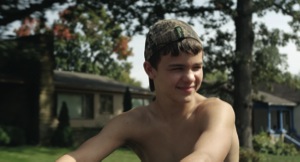
Andrew is 13 years old and lives in rural Missouri, in a town an hour or so from Kansas City. He is a handsome kid, articulate and wise beyond his years. He’s also often cheerful, and I found this surprising and endearing. In Andrew Droz Palermo and Tracy Droz Tragos’ extraordinary documentary about three adolescent boys in Rich Hill, Mo., Andrew’s life is profoundly hard; he and his family are trapped in poverty and constantly focused on day-to-day survival.
About an hour into the film, Andrew tells the filmmakers, “I praise God. I worship him. I pray to him every night. Nothing’s came, but that ain’t going to stop me. This is what goes through my mind: God has to be busy with everyone else. Eventually, he will come to my life. I hope it happens. It’s gonna break my heart if it don’t.”
Rich Hill, which won the documentary competition at Sundance this year and will likely be shortlisted for an Academy Award, is a powerfully affecting film about the cycle of poverty in rural white middle America. Palermo and Tragos (who are cousins) followed three boys living in the small country town, recording their family squabbles, their school conflicts and their dreams, fears, teenage obsessions, and, like Andrew’s prayers, their understandings of the world they’ve been born into. Palermo’s ability to capture the most profound utterances of the boys and their families and Tragos’ aching beautiful cinematography – reminiscent of a cross between Dorothea Lange’s photography of Depression-era farmworkers and Terrance Malick’s epic landscapes – combine to create an indelible American story of the stale underside of the American Dream.
In addition to Andrew, the film focuses on 15-year-old Harley and 12-year-old Appachey. Harley is clearly the most dynamic of the three, partly because of his funny, sometimes charismatic monologues and partly because of his uncontrollable temper. He loves knives and his mother. But he lives with his grandmother because his mother is in prison, convicted of attempting to kill Harley’s stepfather, who had raped him and was never charged. The anger seething inside Harley is justifiable, and he can barely keep it in check, his hands shaking in fury as an assistant principal tells him, no, he cannot go home pretending to be sick for the umpteenth time in a month. His grandmother is heroically patient.
Appachey is not nearly as talkative on camera as Harley and Andrew. He’s younger, and he also has a series of psychiatric problems, from ADHD to possibly Asperger’s. His mother Delena speaks more, and she’s clearly overwhelmed by her son’s difficulties, his fighting, his willfulness and her own limitations. She’s a single mother with two kids and a waitress job; she says she left her mother’s house at 17 and immediately got married. “I never had dreams.” She can’t seem to get Appachey to take his medications or to behave in school and wonders whether institutionalizing him will be the only way to control him and relieve her.
Andrew seems to be the most recognizable figure in the film because the poor boy with gumption and a smile is an archetype in American narratives. And it’s Missouri, too; he could be Tom Sawyer or Huck Finn. He could be a Horatio Alger character, pulling himself up from his bootstraps every time he leaves school and immediately starts mowing lawns for anyone who will pay him. But his mother is ill and his father, who does odd-jobs, cannot make ends meet. Andrew and his twin sister are being moved constantly and the struggle is continuous. In the stories American kids are told or are told to read, the boy like Andrew always ends up succeeding. In Rich Hill, we see that this plot is just a myth. Hard work and initiative and belief in God are not enough to escape poverty. And watching Andrew wait for God to get to his life and help him is heartbreaking.
MOVIE REVIEW
Rich Hill
Written by Andrew Droz Palermo and Tracy Droz Tragos
Unrated
Opens Aug. 22 at Landmark La Jolla Village











